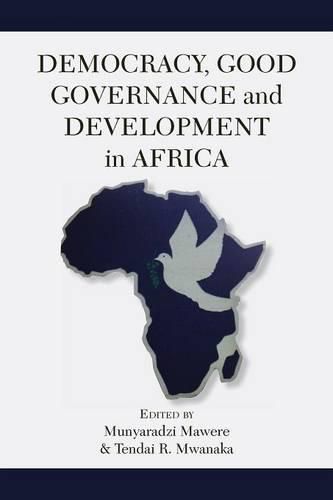Readings Newsletter
Become a Readings Member to make your shopping experience even easier.
Sign in or sign up for free!
You’re not far away from qualifying for FREE standard shipping within Australia
You’ve qualified for FREE standard shipping within Australia
The cart is loading…






This title is printed to order. This book may have been self-published. If so, we cannot guarantee the quality of the content. In the main most books will have gone through the editing process however some may not. We therefore suggest that you be aware of this before ordering this book. If in doubt check either the author or publisher’s details as we are unable to accept any returns unless they are faulty. Please contact us if you have any questions.
Questions surrounding democracy, governance, and development especially in view of Africa have provoked acrimonious debates in the past few years. It remains a perennial question why some decades after political independence in Africa the continent continues experiencing bad governance, lagging behind socio-economically, and its democracy questionable. We admit that a plethora of theories and reasons, including iniquitous and maledictious ones, have been conjured in an attempt to explain and answer the questions on why Africa seems to be lagging behind other continents in issues pertaining to good governance, democracy and socio-economic development. Yet, none of the theories and reasons proffered so far seems to have provided enduring solutions to Africa’s diverse complex problems and predicaments. This book dissects and critically examines the matrix of Africa’s multifaceted problems on governance, democracy and development in an attempt to proffer enduring solutions to the continent’s long-standing political and socio-economic quandaries and hitches. Contributions are by African scholars and researchers from different disciplinary orientations and countries. Grounded in empirical reality as well as the lived experiences of the contributors, the book is an invaluable asset for social scientists, development practitioners, politicians and civil society activists.
$9.00 standard shipping within Australia
FREE standard shipping within Australia for orders over $100.00
Express & International shipping calculated at checkout
This title is printed to order. This book may have been self-published. If so, we cannot guarantee the quality of the content. In the main most books will have gone through the editing process however some may not. We therefore suggest that you be aware of this before ordering this book. If in doubt check either the author or publisher’s details as we are unable to accept any returns unless they are faulty. Please contact us if you have any questions.
Questions surrounding democracy, governance, and development especially in view of Africa have provoked acrimonious debates in the past few years. It remains a perennial question why some decades after political independence in Africa the continent continues experiencing bad governance, lagging behind socio-economically, and its democracy questionable. We admit that a plethora of theories and reasons, including iniquitous and maledictious ones, have been conjured in an attempt to explain and answer the questions on why Africa seems to be lagging behind other continents in issues pertaining to good governance, democracy and socio-economic development. Yet, none of the theories and reasons proffered so far seems to have provided enduring solutions to Africa’s diverse complex problems and predicaments. This book dissects and critically examines the matrix of Africa’s multifaceted problems on governance, democracy and development in an attempt to proffer enduring solutions to the continent’s long-standing political and socio-economic quandaries and hitches. Contributions are by African scholars and researchers from different disciplinary orientations and countries. Grounded in empirical reality as well as the lived experiences of the contributors, the book is an invaluable asset for social scientists, development practitioners, politicians and civil society activists.